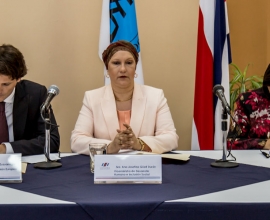An international forum and peer review indicate the need for a governing institution for social policies in Costa Rica
EUROsociAL supports policy and institutional debate on the basis of Latin American and European experiences
Costa Rica currently shows wide diversity in the public institutions dedicated to social policies in the country. The Presidential Social Council has 33 full members who have input into diverse aspects of the country's social policies. Moreover, stagnation in the evolution of socio-economic indicators is being observed, a factor that also complicates public action in this area. The diagnoses point to a lack of a central focus and of a comprehensive policy, in the areas of both social inclusion and human development. The offer is disjointed because the institutions act separately, and at different times and places. The absence of a permanent social authority with public policy leadership, prioritisation, and coordination functions is an element that has inhibited growth and coherent adaptation of the social protection system.
In this context, the government of Costa Rica organised two events: the international forum entitled "Challenges for Costa Rican social policy based on other international experiences" (19th November 2015), and a closed-door peer review (20th November 2015) to analyse a legislative reform aimed at reorganising the social sector based on the establishment of a governing body. Ministerial authorities, legislators, academic experts, and political leaders that support the initiative participated.
EUROsociAL, a European Union cooperation programme, supported both events by contributing viewpoints arising from experiences in Latin America and Europe. The forum included input from María Fernanda Villegas (former Minister of Social Development of Chile); Marcia Lópes (former Minister of Social Development of Brazil); Etzon Romo (Deputy Minister-Coordinator of Social Development of Ecuador); Francesco Maria Chiodi (IILA, Coordinator of the EUROsociAL Social Policies area); and Gala Díaz Langou (Coordinator of the Social Protection Programme of CIPPEC, Argentina, EUROsociAL's operational partner).
The forum was inaugurated by Ana Josefina Güell, Deputy Minister of Human Development and Social Inclusion; Deputy Emilia Molina Cruz; and the European Union Ambassador to Costa Rica, Pelayo Castro Zuzuarregui. The Ambassador recalled that Costa Rica recently confirmed its commitment at the highest level to the goal of joining the OECD, a process that has the support of the European Union. Within this framework, the Public Governance Review conducted by the OECD indicates, among other recommendations, the need to "Strengthen the centre of government’s leadership and coordination capacity...". In this sense, he added, the initiative launched by the government is particularly appropriate in terms of its content, of course, but also in terms of its timing. He also showed pride in the support provided by European cooperation through EUROsociAL, the "flagship programme of the European Union in Latin America for social cohesion".
The two events were closed by the Vice President of the Republic, Ana Helena Chacón, who expressed her full satisfaction with the contributions, particularly in terms of their usefulness as international references that help in the process of defining a new architecture for governance in the social sector. This process will continue in coming months, and in May 2016 the parliamentary discussion on a draft reform law will begin. The new "form" to be adopted by the social sector must translate into better policies for all Costa Ricans.
IILA

